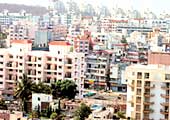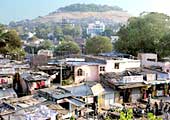 |
| Silicon Valley? More like racers' alley,
with college students and office-goers revving it up |
MONDAY, SEPTEMBER 12, 2005
En route from Pune to Mumbai, 5.30 p.m.
The
epiphany doesn't come till our ride out of Pune, but when it does,
it arrives suddenly. It's raining and both driver and car are
focussed on getting out of Pune city and on to the Mumbai-Pune
expressway and its promise of a two-hour ride home. Then, I am
in Kothrud. To the right is the suburb itself, all glass and chrome,
screaming affluence from every window of every high rise (there
are lots of both, windows and high rises). To the left is a sprawling
shanty town that progressively climbs the hill against which it
is set. That's a scene worthy of Big Brother Mumbai. Then, it
isn't just about contrasts; it is about everything that makes
every large Indian city hell to live and work in, illegal tenements,
unplanned growth and the inability to cope with migrants.
Pune is that strange thing as far as Indian
cities go, a unique combination of student-town, retirees-paradise,
manufacturing-hub and it-hotspot rolled into one compelling package.
And, circa 2005, in one of those developments that no one can
quite predict, the city is emerging a preferred destination for
it and IT-enabled services firms seeking an alternative to grid-locked
Bangalore. Yes, Pune has always been a favourite with companies
operating in the two areas, but there has always been a clutch
of other cities that compares favourably with it. Now, goes the
refrain, Pune is it. Actually, not quite; Chennai and its suburb
Siruseri are it, but Pune has something going for it that the
other city does not. This isn't the weather although that can
be considered a factor (Pune's is balmy and salubrious; Chennai's
is hot and muggy). "Pune tops the list with the highest ratings
in skills, (in terms of both) availability and retention, and
will be a close contender for a Tier I slot for it outsourcing
by 2010," says New Vernon Partners' Promod Haque, one of
the world's best known venture capitalists, referring to a recent
report put out by Gartner, an it research and consulting firm.
The way he sees it, the manufacturing companies provide a pool
of talent boasting the kind of engineering skills that software
companies engaged in high-end work crave, and the presence of
a large number of engineering and business schools "is encouraging
entrepreneurship the way Stanford has done in Silicon Valley".
"Pune is one of the hottest cities to watch in India today,"
sums up Haque.
 |
| Pune City: Urban sprawl, yes, but it
is also sign of a booming local economy |
 |
| Urban mess: This shanty town creeping
up the hillside compares with Mumbai's worst |
That's a fair assessment and it could explain
why some of New Vernon's more high-profile investments (think
Veraz Networks and AmberPoint) are in the process of putting down
development centres in the city. As for it-enabled services firms,
the city has its own (and obvious) charms. One such firm is Ventura,
a large UK company (2004 revenues: £131 million or Rs 1,034.9
crore) that opened its first ever offshore centre in Pune three
months back. "Pune struck us as a great option given the
educational hub it is," says Anupam Arun, Country Manager,
Ventura India. "It draws people from all over the country
and that is great from the voice perspective of the business."
Arun also claims that wage- and infrastructure-costs are lower
in Pune, although Kaushik Shekar, a portfolio management consultant
who moved to the city recently, points out that "if you take
away rentals and conveyance costs, the cost of living is just
as high as in Mumbai", and Mathai Joseph, Executive Vice
President, Tata Consultancy Services (he heads the firm's R&D
centre in Pune and says the company will soon club much of this
and its four development centres in the city into one large campus)
believes the city could do with some investment in infrastructure.
"Pune simply hasn't had the investment it needs in roads
and power," he says.
That combination of problems, power and roads,
brings to mind Bangalore, and the urban mess it has been reduced
to, and Arun, who admits that there are several things that need
to be addressed on both fronts, says, "That's simply not
an image we want to lapse into." Already, city-based activists
(a very strong constituency and a possible carry over from Pune's
standing as an education hub with a multitude of institutions
offering practically every discipline of the arts, sciences and
technology) are crying themselves hoarse over hills being hacked
down to make way for ill-planned townships or over traffic that
crawls to a halt as arterial roads simply buckle under the pressure.
 |
| Bumper-to-bumper: Snarling traffic headaches
(and pollution) bring to mind bustling Bangalore |
So, will Pune go the Bangalore way or will
it live up to Haque's vision? As my car finds its way to the expressway
on our way out of Pune, I catch a few reassuring signs that the
city just might not yet be lapsing into the kind of urban mayhem
that Mumbai is. Small processions accompany Ganesh idols (the
annual Ganesh festival is a big thing in all Maharashtra, including
Mumbai) as they are reverentially lowered into the river, in sharp
contrast to the traffic-stopping ones that do so in Mumbai (the
city virtually comes to a halt on the day of visarjan, or immersion
of the idols). I later find out that the city has strict regulations
governing the composition of the idols themselves (they have to
be made of dissolvable materials since they are to be immersed
in the river) and that non-governmental organisations dig giant
pits across the city to make compost out of flowers used in the
puja. Maybe there is hope for this city after all.
|







